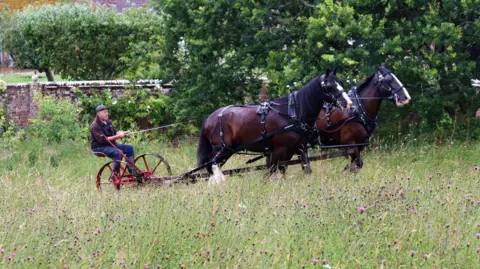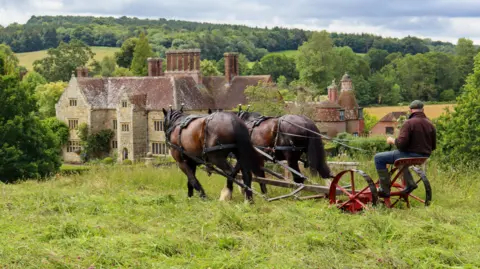Joshua Askew
BBC News, South East

Lucy Evans
Scotney Castle has started using horses for mowing duties to help grow wildflower meadows
Time-honoured techniques are bringing nature back to life in Kent.
Scotney Castle, near Lamberhurst, is owned by the National Trust and has started using horses for mowing duties to help grow wildflower meadows on the estate.
The Oakwood Clydesdale horses - called Percy and Frank – are used as they cause less damage to the soil and wildlife when clearing vegetation compared to modern machines, the trust said.
They are also more environmentally friendly than heavy machinery since they do not need fossil fuels, it adds.
'Amazing to see'
After a small mowing test with the horses last year, Scotney Castle ranger Richard Newman said wildflowers began to “bounce back” quicker than when tractors were used.
"It was amazing to see. We noticed that the meadow bounced back, with more wildflowers,” he said.
"We believe this is mainly because the horses cause much less compaction of the soil, so the wildflowers are able to break through again quickly.”
He added: "The light fertilisation from horse manure is an added bonus.”
Scotney Castle has started using horses for mowing duties to help grow wildflower meadows
Time-honoured techniques are bringing nature back to life in Kent.
Scotney Castle, near Lamberhurst, is owned by the National Trust and has started using horses for mowing duties to help grow wildflower meadows on the estate.
The Oakwood Clydesdale horses - called Percy and Frank – are used as they cause less damage to the soil and wildlife when clearing vegetation compared to modern machines, the trust said.
They are also more environmentally friendly than heavy machinery since they do not need fossil fuels, it adds.
'Amazing to see'
After a small mowing test with the horses last year, Scotney Castle ranger Richard Newman said wildflowers began to “bounce back” quicker than when tractors were used.
"It was amazing to see. We noticed that the meadow bounced back, with more wildflowers,” he said.
"We believe this is mainly because the horses cause much less compaction of the soil, so the wildflowers are able to break through again quickly.”
He added: "The light fertilisation from horse manure is an added bonus.”

Lucy Evans
Scotney Castle, near Lamberhurst, is owned by the National Trust
The National Trust said mowing helped regenerate wildflowers as removing vegetation like grasses and nettles reduced the level nutrients in the soil - a condition favoured by wildflowers.
Flowers then attract insects and birds, which improve biodiversity, the trust adds.
Mr Newman said there was a long tradition of using animals on the land in the High Weald, where Scotney Castle is located.
He said that historically oxen were used by farmers to negotiate the deep valleys, small fields and numerous streams and rivers of the area.
"Sadly these older practices are dying out, but it’s worth trying to get them back again," he added.
Scotney Castle, near Lamberhurst, is owned by the National Trust
The National Trust said mowing helped regenerate wildflowers as removing vegetation like grasses and nettles reduced the level nutrients in the soil - a condition favoured by wildflowers.
Flowers then attract insects and birds, which improve biodiversity, the trust adds.
Mr Newman said there was a long tradition of using animals on the land in the High Weald, where Scotney Castle is located.
He said that historically oxen were used by farmers to negotiate the deep valleys, small fields and numerous streams and rivers of the area.
"Sadly these older practices are dying out, but it’s worth trying to get them back again," he added.
No comments:
Post a Comment